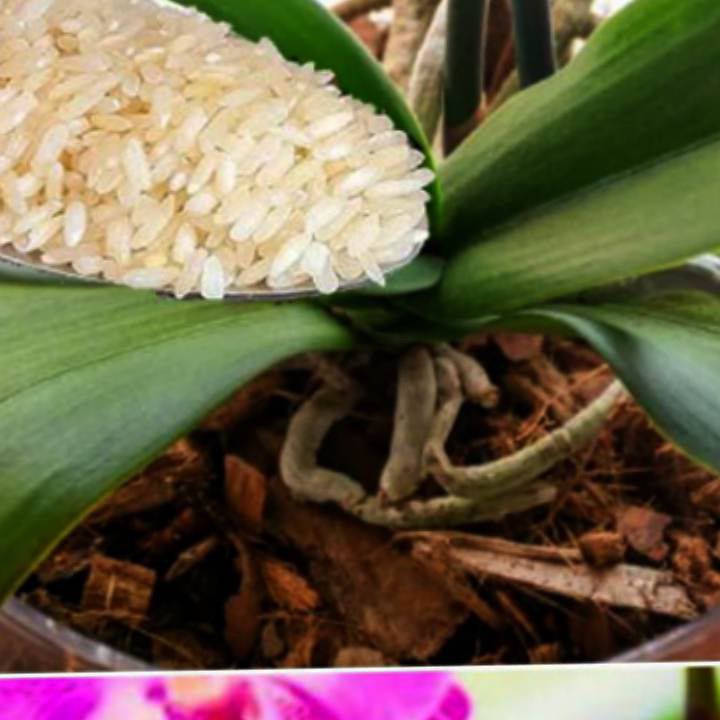Orchids are stunning, delicate flowers that require specific nutrients to thrive and bloom to their fullest. While commercial orchid fertilizers are available, a homemade rice-based fertilizer can offer a natural, eco-friendly alternative that encourages robust growth and vibrant blooms. Rice water contains essential nutrients, including nitrogen, phosphorus, and potassium, which are beneficial for orchids. Let’s explore why rice water is effective, how to make it, and how to use it for optimal orchid care.
Why Rice Water Benefits Orchids
Rice water is rich in a range of nutrients, enzymes, and beneficial compounds that orchids love. Here’s a breakdown of some essential nutrients found in rice water and how they help orchids:
Nitrogen – Promotes healthy leaf and stem growth, providing orchids with a strong foundation to support blooms.
Phosphorus – Encourages healthy root development and flowering, enhancing the orchid’s ability to produce large, vibrant flowers.
Potassium – Increases disease resistance and strengthens the plant’s overall structure, improving the quality and longevity of blooms.
Trace minerals – Rice water also contains magnesium, zinc, and iron, which are vital for various physiological processes, contributing to the plant’s overall health.
This natural combination makes rice water an excellent choice for promoting orchid blooms while avoiding the chemical buildup associated with synthetic fertilizers.
How to Make Rice Water Fertilizer for Orchids
There are a couple of ways to make rice water fertilizer. Here are two simple methods to prepare rice water for your orchids:
Method 1: Soaked Rice Water
Rinse ½ cup of uncooked rice to remove any debris or impurities.
Place the rinsed rice in a bowl and add two cups of water.
Soak the rice for 15-30 minutes, stirring occasionally to release nutrients into the water.
Strain the rice, collecting the water in a clean container. This water is now ready to be used as a fertilizer for your orchids.
Method 2: Fermented Rice Water
Follow steps 1-3 above to prepare soaked rice water.
Transfer the rice water to a container with a loose lid, and leave it at room temperature for 24-48 hours to allow fermentation. Fermentation enhances the nutrient profile, but avoid letting it ferment too long, as it can develop a sour smell.
Dilute the fermented rice water with an equal amount of fresh water before use, as fermentation makes it more potent.
How to Apply Rice Water to Orchids
Once your rice water fertilizer is ready, using it on your orchids is straightforward. Here’s how:
Dilute the Rice Water – Orchids are sensitive to strong solutions, so always dilute the rice water with plain water. Use a 1:1 ratio for fermented rice water and a 1:2 ratio for soaked rice water.
Water the Roots – Pour the diluted rice water directly onto the orchid’s roots, avoiding the leaves and flowers. Roots can absorb nutrients more efficiently, providing immediate benefits to the plant.
Use Once Every Two Weeks – To prevent over-fertilizing, apply rice water once every two weeks. Orchids require less frequent feeding than other plants, and over-fertilizing can lead to nutrient imbalances.
Additional Tips for Blooming Orchids with Rice Water
Monitor Orchid Health – Watch your orchid’s leaves and roots after applying rice water. Healthy orchids will have firm, green leaves and robust root systems, while signs of yellowing or wilting may indicate over-fertilization.
Use Room-Temperature Water – Orchids are sensitive to temperature extremes, so always use room-temperature water to avoid shocking the plant.
Combine with Regular Care – Rice water fertilizer works best when combined with good orchid care practices, such as proper light, humidity, and watering routines. Orchids need indirect sunlight and prefer a well-draining orchid potting mix to avoid root rot.
Benefits of Rice Water Fertilizer for Orchid Blooms
Enhanced Flowering – The nutrients in rice water, particularly phosphorus, stimulate flowering, leading to larger and more vibrant blooms.
Stronger Roots – Phosphorus and potassium in rice water strengthen the roots, enabling the orchid to absorb nutrients and water more effectively.
Environmentally Friendly – Rice water is a natural, waste-free option, making it a sustainable choice for orchid enthusiasts who prefer eco-friendly practices.
Common Mistakes to Avoid
Using Undiluted Rice Water – Concentrated rice water can overwhelm orchids. Always dilute before applying.
Over-Fertilizing – Orchids don’t need frequent feeding. Limit rice water use to once every two weeks or once a month during dormant periods.
Applying to Leaves – Avoid spraying rice water on the leaves or blooms, as it may promote fungal growth and damage the delicate petals.
Rice water is a gentle, nutrient-rich homemade fertilizer that can promote healthier, more vibrant orchid blooms when used properly. By using this simple yet effective natural fertilizer, you can give your orchids a nutrient boost without relying on synthetic chemicals. Remember, the key to success is consistency and moderation, ensuring your orchids receive the care and nourishment they need to thrive. With a little patience and routine care, your orchids can reward you with stunning, long-lasting blooms all season long.
